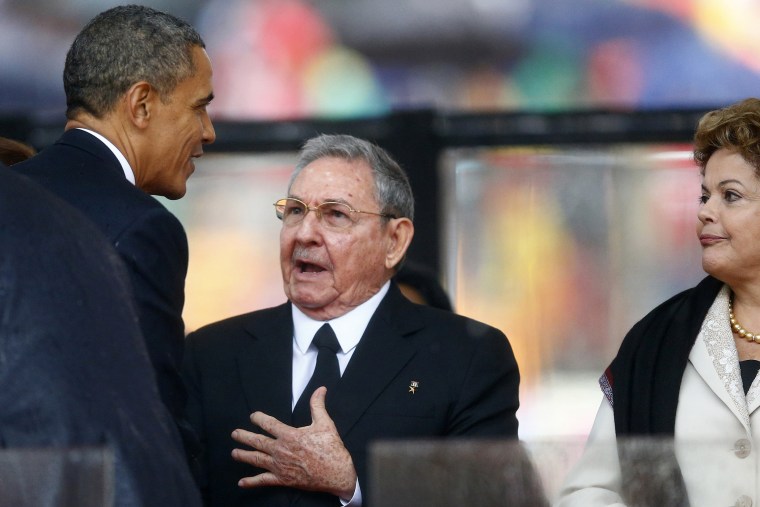When President Obama rose to speak on Tuesday at the packed memorial for the late Nelson Mandela, most watching likely anticipated the tribute from America’s first black president to the life and legacy of South Africa’s would be historic. And it was.
But something unexpected and extraordinary happened before Obama even reached the podium--he stopped to shake hands with Cuban President Raul Castro, leader of America’s long-isolated Cold War rival.
More than a half-century has passed since the U.S. severed ties with its island neighbor after diplomatic relations soured under the communist regime of Castro’s brother, Fidel. To this day, the U.S. maintains an economic embargo against Cuba, which Cuban Foreign Minister Bruno Rodriguez recently claimed has cost the country more than $1 trillion and qualified as “an act of genocide.”
But Tuesday’s handshake before mourners numbering in the tens of thousands signaled a potential shift in U.S.-Cuban relations, and--more than anything--the enduring power of Nelson Mandela to bring together those long-estranged by ideological differences. Said a White House official in a statement:
"This wasn't a pre-planned encounter. Above all else, today is about honoring Nelson Mandela, and that was the president's singular focus at the memorial service."
Members of the right reacted hotly to Obama’s friendly gesture, and his own administration sought to downplay its diplomatic significance. Todd Zwillich, of Public Radio International, posted audio of Sen. John McCain comparing the moment to when “Neville Chamberlain shook hands with Hitler.” Meanwhile, when asked about the handshake at a House hearing on Iran, Secretary of State John Kerry pointed to Obama’s speech that the day was about honoring Nelson Mandela, and his struggle to uphold basic human rights.
“Would you say that Raul Castro is upholding basic human rights,” Republican Rep. Ileana Ros-Lehtinen asked.
“No, absolutely not,” replied Kerry.
South Africans, world leaders, and dignitaries flooded FNB Stadium in Soweto--the last place Mandela appeared in public--to bid farewell to the anti-apartheid activist turned political prisoner turned president, who emerged from nearly 30 years behind bars to usher in the end of segregation in his country. Mandela passed away Dec. 5 at the age of 95, after a long battle with illness.
Though the occasion was somber and the sky gray, the mood was celebratory -- attendees danced and sang in spite of the cold rain. Tuesday’s memorial service took place 20 years to the day after Mandela and F.W. de Klerk, South Africa’s last white president, traveled together to Oslo, where the two received a shared Nobel Peace Prize.
President Obama was joined by his wife, first lady Michelle Obama, and his predecessors from both sides of the aisle, former Presidents George W. Bush, Bill Clinton, and Jimmy Carter. Former Secretary of State Hillary Clinton also attended.
“It is tempting, I think, to remember Nelson Mandela as an icon, smiling and serene, detached from the tawdry affairs of lesser men,” Obama said in his eulogy. But, he added, Mandela “was not a bust made of marble; he was a man of flesh and blood--a son and husband, a father and a friend.”
Both Mandela’s ex-wife and widow were present, as were his children and grandchildren, four of whom made speeches.
“Tata, a son of Africa. A child of Thembu. A descendant of great kings. You will always be remembered,” said General Thanduxolo Mandela, Nelson Mandela’s cousin. “The powerful and the weak, the rich and the poor are all here. I'm sure Madiba is smiling as he looks down on diverse faces.”
Andrew Mlangeni, who occupied the cell next to Mandela at Robben Island, said of his close friend: “He touched my heart, my soul, my life and those of millions of South Africans.”
Other speakers included U.N. Secretary-General Ban Ki-moon, who received boisterous applause, and the leaders of the African Union, Brazil, China, Namibia, and India. Zimbabwe President Robert Mugabe, who publicly clashed with Mandela and faced a barrage of sanctions from western governments, was also present, and he also shook hands with President Obama.
The crowd was not as kind to current South African leader, President Jacob Zuma, who received boos when his face appeared on a giant video screen. Many have called for Zuma’s resignation after allegations surfaced that he spent millions of taxpayer money on his personal home.
A more lighthearted moment came when Obama was seated with British Prime Minister David Cameron and Danish Prime Minister Helle Thorning-Schmidt. The three were seen taking a “selfie” -- or self-portrait -- together.
Mandela’s body will lie in state for three days at the Union Buildings in Pretoria before being transported to the Eastern Cape. A procession will take place from Mthatha to Qunu, Mandela's ancestral home, where the Thembu community to which he belonged will conduct a traditional ceremony. There, a state funeral is scheduled for Sunday and Mandela’s body will be laid to rest.
